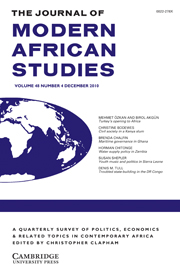Piet Konings & Francis B. Nyamnjoh ~ The Anglophone Problem In Cameroon
No Comments yet The Journal of Modern African Studies, 35, 2 (1997), pp. 207–229. – Printed in the United Kingdom. © 1997 Cambridge University Press
The Journal of Modern African Studies, 35, 2 (1997), pp. 207–229. – Printed in the United Kingdom. © 1997 Cambridge University Press
The political agenda in Cameroon has become increasingly dominated by what is known as the ‘anglophone problem’, which poses a major challenge to the efforts of the post-colonial state to forge national unity and integration, and has led to the reintroduction of forceful arguments and actions in favour of ‘federalism’ or even ‘secession’.
The root of this problem may be traced back to 1961 when the political élites of two territories with different colonial legacies – one French and the other British – agreed on the formation of a federal state.[i] Contrary to expectations, this did not provide for the equal partnership of both parties, let alone for the preservation of the cultural heritage and identity of each, but turned out to be merely a transitory phase to the total integration of the anglophone region into a strongly centralised, unitary state. Gradually, this created an anglophone consciousness: the feeling of being ‘marginalised’, ‘exploited’, and ‘assimilated’ by the francophone-dominated state, and even by the francophone population as a whole.
It was not until the political liberalisation process in the early 1990s that some members of the English-speaking élite started openly to protest against the supposed subordinate position of the anglophones and to lay claims for self-determination and autonomy. Whereas the most important organisations initially called for a return to the federal state, the persistent refusal of the Government headed by President Paul Biya to discuss any related constitutional reforms forced some to adopt a secessionist stand. They attempted to gain international recognition for their demands through a diplomatic offensive that presented the anglophones as an oppressed minority whose territory had been ‘annexed’ by the francophone-dominated state. The Government has not surprisingly devised various strategies to safeguard the unitary state, including attempts to minimalise or even deny the existence of an ‘ anglophone problem’, to create divisions among the English-speaking presented the anglophones as an oppressed minority whose territory had been ‘ annexed’ by the francophone-dominated state. The Government has not surprisingly devised various strategies to safeguard the unitary state, including attempts to minimalise or even deny the existence of an ‘ anglophone problem’, to create divisions among the English-speaking élite, to remunerate some allies with prestigious positions in the state apparatus previously reserved for francophones only, and to repress all actions designed to change the status of the Southern Cameroons.
The Constitutional Background
The birth of the Federal Republic of Cameroon on 1 October 1961 marked the reunification of two territories which had undergone different colonial experiences after World War I,[ii] when the erstwhile German Kamerun Protectorate was partitioned between the British and the French, first as ‘mandates’ under the League of Nations and later as ‘ trusts’ under the United Nations.[iii] It needs to be recalled that part of the British mandate}trust territory, which came to be called Southern Cameroons, was initially attached to the Eastern Provinces of Nigeria until 1954, when it achieved a quasi-regional status and a limited degree of self-government within the Federation of Nigeria, where it attained full regional status in 1958. There can be no doubt that the administration of Southern Cameroons as an appendage of Nigeria resulted in the blatant neglect of its development,[iv] as well as the dominant position of Ibo and Efik-Ibibio migrants in its economy.
It was Southern Cameroons which voted in the 1961 United Nations plebiscite for reunification with French Cameroun rather than for integration into Nigeria.[v]
Download paper (PDF): https://openaccess.leidenuniv.nl/ASC-1246231-023.pdf?
* Piet Konings is Senior Researcher at the Afrika-Studiecentrum, Leiden, and Francis Nyamnjoh is Senior Lecturer at the University of Buea, Cameroon.
Notes:
[i] Other scholars trace the genesis of the anglophone problem in Cameroon to World War I. According to Nicodemus Awasom, ‘The Development of Autonomist Tendencies in Anglophone Cameroon, 1960–61’, the unequal partition of the country between France and Britain, following the defeat of Germany in West Africa in 1916, ‘sowed the seeds of future problems’ in that this accounted for ‘ the ultimate emergence, in a reunified Cameroon, of an anglophone minority and a French majority’.
[ii] See, for instance, Willard R. Johnson, The Cameroon Federation: political integration in a fragmentary society (Princeton, NJ, 1970); Victor T. Le Vine, The Cameroon Federal Republic (Ithaca and London, 1971); and Jacques Benjamin, Les Camerounais occidentaux : la minorité dans un état bicommunautaire (Montreal, 1972).
[iii] See Edwin W. Ardener, ‘The Political History of Cameroon’, in The World Today (London), 18, 8, 1962, pp. 341–50; David E. Gardinier, Cameroon : United Nations challenge to French policy (Oxford, 1963); Victor T. Le Vine, The Cameroons : from mandate to independence (Berkeley and Los Angeles, 1964); and Richard A. Joseph, Radical Nationalism in Cameroun : social origins of the U.P.C. rebellion (Oxford, 1977).
[iv] According to Paul M. Kale, Political Evolution in the Cameroons (Buea, Government Printer, 1967), pp. 12-13, Britain’s administration prior to World War II was ‘haphazard and full of misgivings’, provoked by ‘ an apparent lack of administrative interest’ which he thinks was due to ‘ the fear that Germany might suddenly demand a return of her former African possessions’. For this reason, Britain might have thought it ‘preposterous spending, and possibly wasting, British taxpayers’ money and talent on what was not, strictly speaking, a developing British country’. From Le Vine, op. cit.1964, pp.194–201, we gather that Whitehall often regarded Southern Cameroons ‘as somewhat of a colonial liability’, administered all the way from Lagos, with hope of its ‘eventual integration with Nigeria’. It had neither a separate budget nor separate public accounts; all its government revenues were treated as part of a common fund.
[v] Concerning reunification, it is worth noting that in spite of a ‘popular’ disinclination for an ‘early reunification after secession from Nigeria’, the UN never gave the people that option. Also, the boundaries of the reunified territory ‘were not willed by those who wished for reunification’,but were imposed on them; consequently, they were much narrower than they would have been ‘if a simple reconstruction of German Kamerun had been achieved’. See Edwin W. Ardener, ‘The Nature of the Reunification of Cameroon’, in Arthur Hazlewood (ed.), African Integration and Disintegration (Oxford, 1967), pp. 285–337.
You May Also Like
Comments
Leave a Reply







